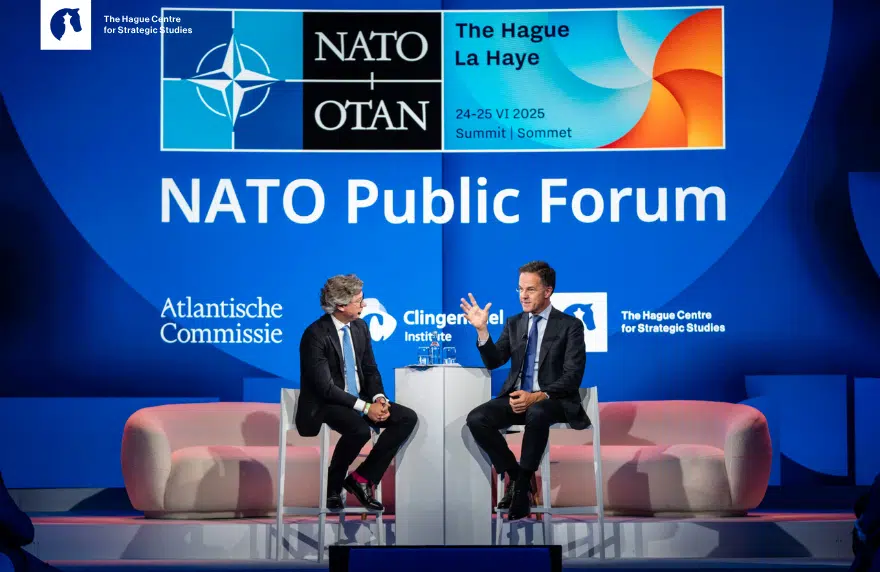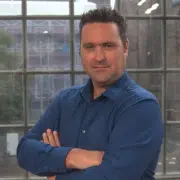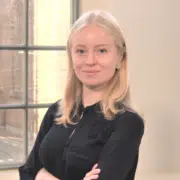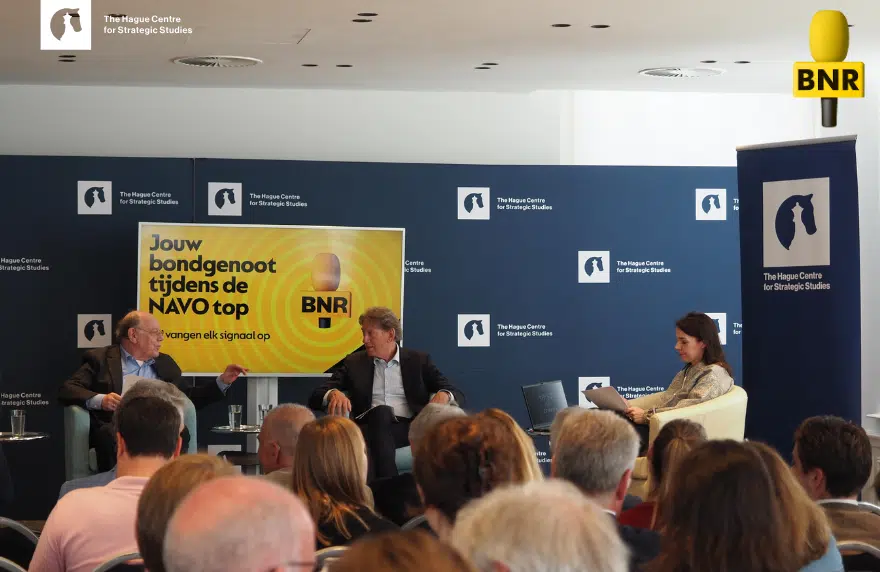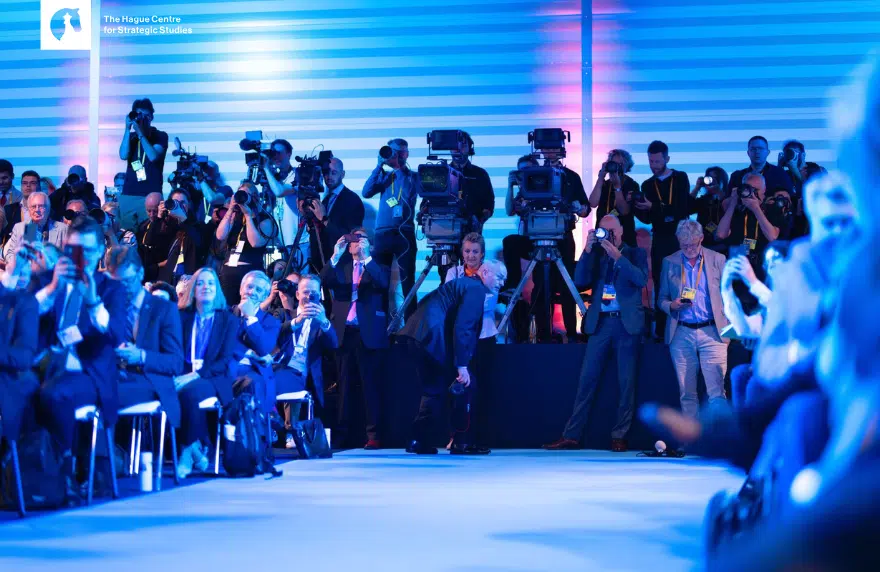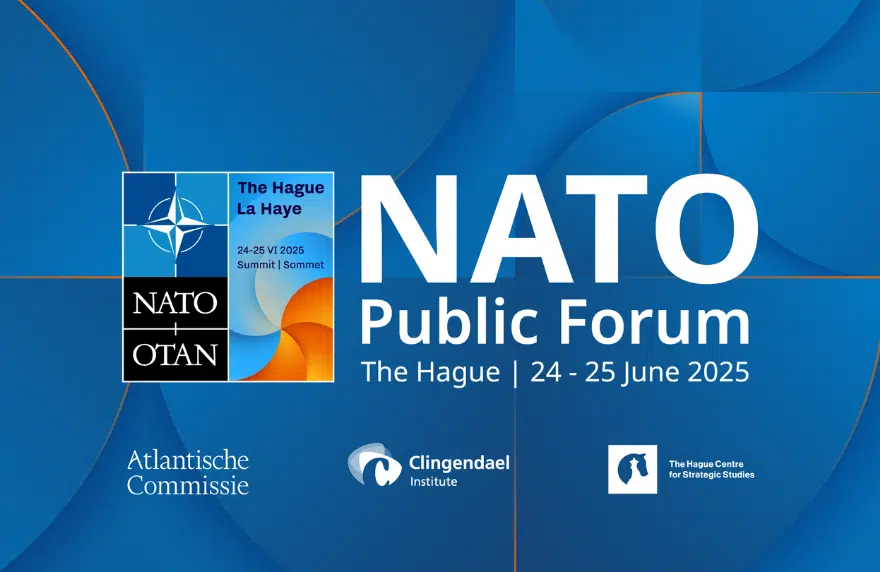Looking back at the 2025 NATO Summit
The Hague, 23 July 2025 | For the first time in history, the NATO Summit was hosted in the Netherlands — one of the Alliance’s founding members. With over 9,000 guests and 150 dignitaries, it marked the largest security operation the country has ever seen.
Co-organised by HCSS, the NATO Public Forum created space for public dialogue, featuring 25 high-level sessions with global leaders, ministers, experts, and journalists — helping to make diplomacy more inclusive, accessible, and transparent.
From the future of warfare to energy security and critical raw materials, Forum discussions spotlighted the changing character of conflict and the pressing need for strategic investment in defence capabilities, infrastructure, and industrial supply chains.
While the Summit showed unity and ambition, important questions remain about implementation, burden-sharing, and strategic direction. HCSS is honoured to have helped shape this historic moment — laying the groundwork for a stronger, more resilient Alliance.
Read on for a reflective look from our team on the floor.
A Historic First: NATO Comes to The Hague
Last month, The Hague made history as it hosted the first-ever NATO Summit on Dutch soil, bringing together world leaders from all 32 NATO member states to set the course for the future of the Alliance. But while diplomacy unfolded behind closed doors, a vigorous parallel conversation took place in public: the 2025 NATO Public Forum.
As one of the official co-organisers of the Forum — alongside the Netherlands Atlantic Association and The Clingendael Institute — The Hague Centre for Strategic Studies (HCSS) played a central role in bringing this unprecedented event to life.
Project coordinators Davis Ellison and Berend Kwak helped develop and deliver panels on critical issues ranging from hybrid warfare and resilience to energy security and defence industrial policy.
“What began as a hallway conversation in Brussels turned into a truly global event,” said Ellison. “Working with over 40 nationalities and dozens of international partners from all around the world was a true highlight. There will of course be plenty to say about the NATO Summit and its outcomes in my normal research role, about which I’ll have plenty to write about/say in the coming weeks. But for now, I can at least celebrate a hard working team for delivering a great international event!”
For two days, on 24–25 June, we shaped a dynamic programme of 25 high-level panels, keynotes, debates, and dialogues, welcoming voices from government, civil society, media, and academia to discuss the evolving security landscape – both on the plenary stage of Studio Alfa, as well as the secondary talk show stage of Studio Bravo.
“Global security isn’t just shaped behind closed doors — it’s a conversation that must include society at large,” said Laura Birkman, HCSS Director of the Climate, Water and Food Security programme. “I’m incredibly proud of our amazing HCSS team, whose dedication and hard work brought to life a dynamic programme of presentations and discussions. On a personal note, a true highlight was learning from and engaging with so many inspiring women shaping and influencing NATO’s strategic conversations.”
For HCSS Research Director Tim Sweijs, the Forum was an important part of a bigger picture: “In a time of rising geopolitical tensions and shifting alliances, a robust and collective defence matter more than ever. The NATO summit in The Hague delivered a sense of relief, but also underscored persistent vulnerabilities within the alliance,” Sweijs reflected.
“The outcome was ‘partially satisfying’ for Europe—but far from a comprehensive success. The greatest concern in recent months was whether the transatlantic alliance might fracture. That didn’t happen, and that in itself is significant.”
Sweijs noted the brevity of the summit and the unusually short final communiqué—just five paragraphs compared to over 65 last year in Washington. “It’s a very ‘Rutte-esque’ text: short, diplomatically crafted, and vague enough for everyone to interpret it as they wish,” he remarked. This flexible ambiguity helped prevent political fallout, but also sidestepped hard commitments.
The reaffirmation of Article 5—the core NATO principle that an attack on one member is an attack on all—was positioned front and centre. “That’s a clear reassurance, especially given uncertainties around U.S. leadership,” said Sweijs.
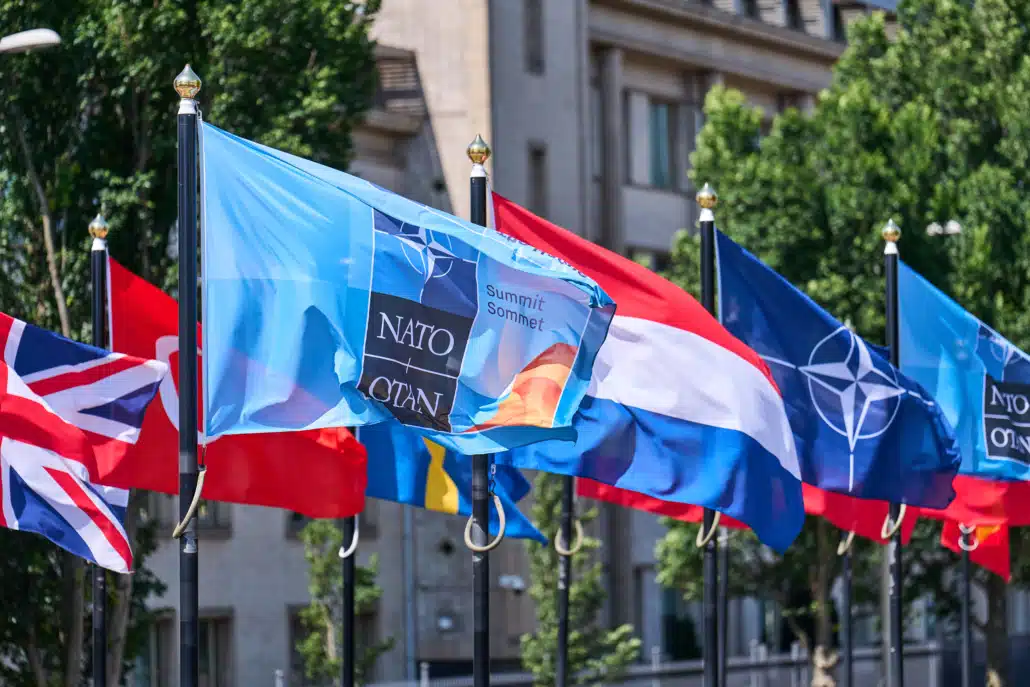
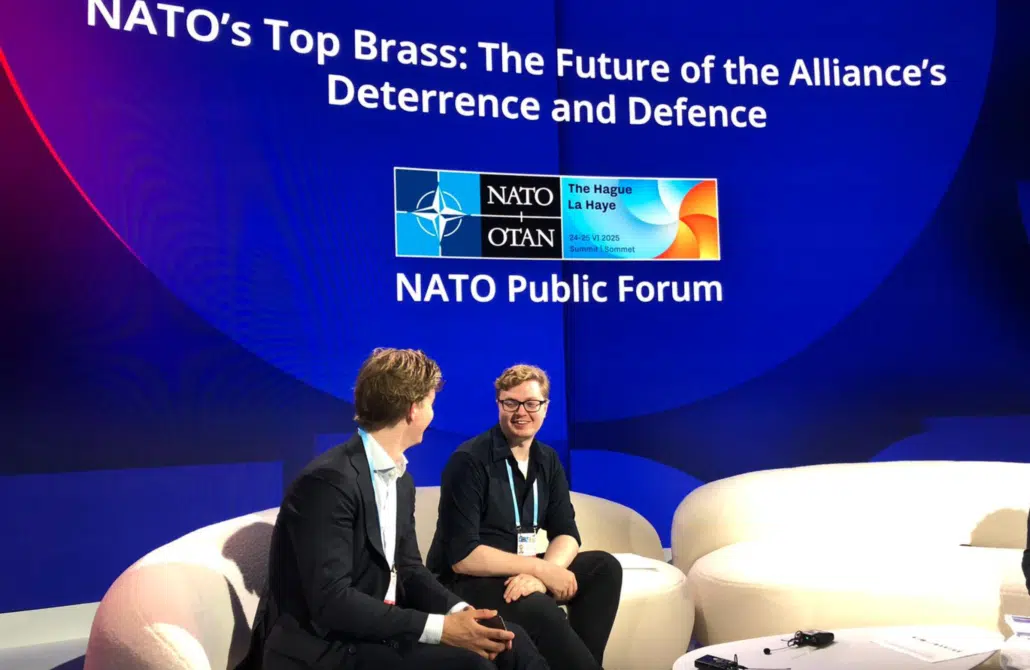
Bringing Diplomacy into the Public Sphere
To set the stage for the 2025 summit in The Hague, the Hague Centre for Strategic Studies (HCSS) organised a series of high-level public and private events throughout 2024 and 2025, with topics ranging from seabed security and digital defence capabilities, to deterrence, emerging technologies, the Baltic Defence Line, and more.
“Looking back on the Public Forum from a public diplomacy perspective, it was a huge success,” said HCSS Communications Manager Patrick Willemsen, who has been managing a continuous stream of press requests for the institute’s analysts and subject matter experts for the past few years, significantly growing its outreach and visibility, and establishing a substantial presence in national and international media. “The near-flawless organisation of the Summit, the accompanying ‘NAVO door Nederland’ tour, and the Public Forum didn’t just put the Netherlands on the map – it put The Hague on the map. And it certainly put HCSS on the map too.”
Working behind the scenes together with Stephanie Govaerts, HCSS Communications and Events Officer, Willemsen noted. “After months of classic Dutch grumbling and complaining – about road closures or cancelled cycling events due to lack of police availability – there suddenly was something rare in the air last month: pride. The Netherlands — and The Hague in particular — showed it could organise a complex, high-stakes international event with precision and purpose. And HCSS was at the heart of it.”
“All eyes were on The Hague,” reflected Berend Kwak. “It was the biggest security operation the Netherlands has ever hosted. We organised 25 high-level sessions, for which every bit of content preparation was done by this consortium of Dutch think tanks. From programming (and all its political complexities) to curating panel discussions and interviews, to running around behind the scenes: our teamwork and the great cooperation with NATO’s Public Diplomacy Division, the Dutch Ministry of Foreign Affairs and the Ministry of Defence of the Netherlands made this go as smooth as possible.”
“On a historic stage, HCSS welcomed the opportunity to help bring critical global security conversations into the public sphere. Whether discussing defence innovation, critical raw materials, or the convergence of physical and digital threats, the Public Forum underscored that security is no longer the exclusive domain of generals and diplomats — it concerns us all,” Willemsen added.
From defence ministers and foreign policy thinkers to climate experts and civil society leaders, the Forum gave space to a truly global conversation. HCSS staff were not only active behind the scenes, but also on stage:
- HCSS Director of Research Tim Sweijs took part in an expert panel on “Future-Proofing the Alliance” on Day 1, discussing military innovation, deterrence, and the changing character of warfare, with Olivier Schmitt (Institute for Military Operations, Royal Danish Defence College), Bastian Giegerich (International Institute for Strategic Studies – IISS) and Kathleen McInnis (Center for Strategic and International Studies – CSIS)
- HCSS founder Rob de Wijk took part in the Day 2 opening panel, reflecting on the summit discussions so far, and setting the scene for the high-stakes discussions among the Alliance leaders gathering that day for the North Atlantic Council, together with Liana Fix (Council on Foreign Relations – CFR), Camille Grand ( European Council on Foreign Relations – ECFR) and Rem Korteweg (Clingendael Institute).
“I very much enjoyed our substantive discussion on what the wars of tomorrow will look like, and how NATO can best invest both in current and future capabilities,” Sweijs looked back on his panel. “The character of conflict is changing rapidly, shaped by accelerating tech cycles and shifting theatres of war. The Alliance must adapt—investing in both current and future capabilities.”
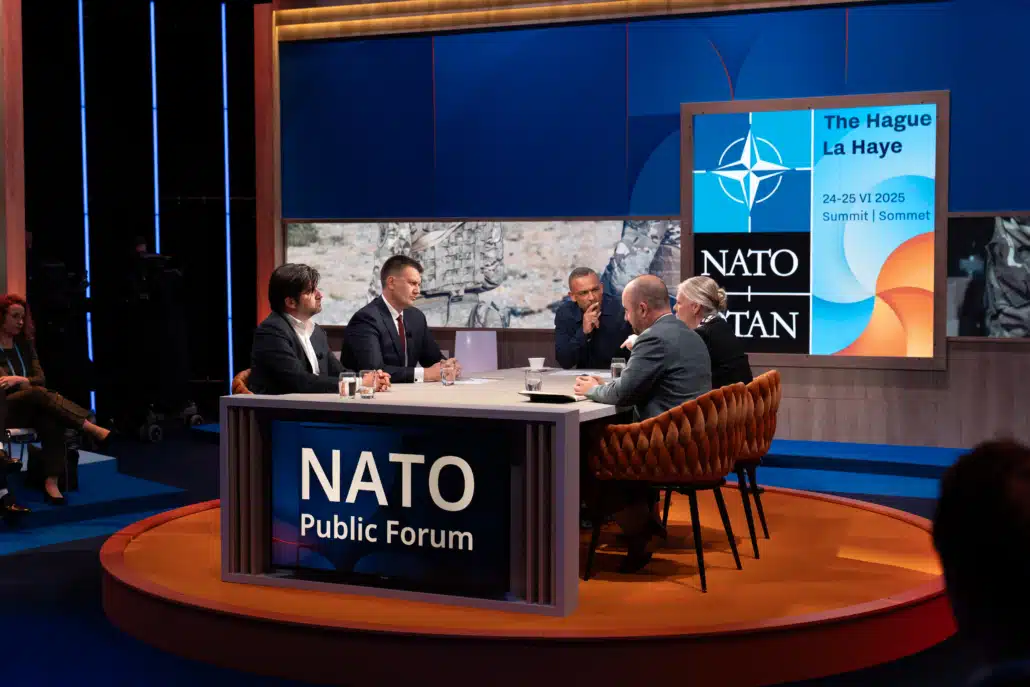
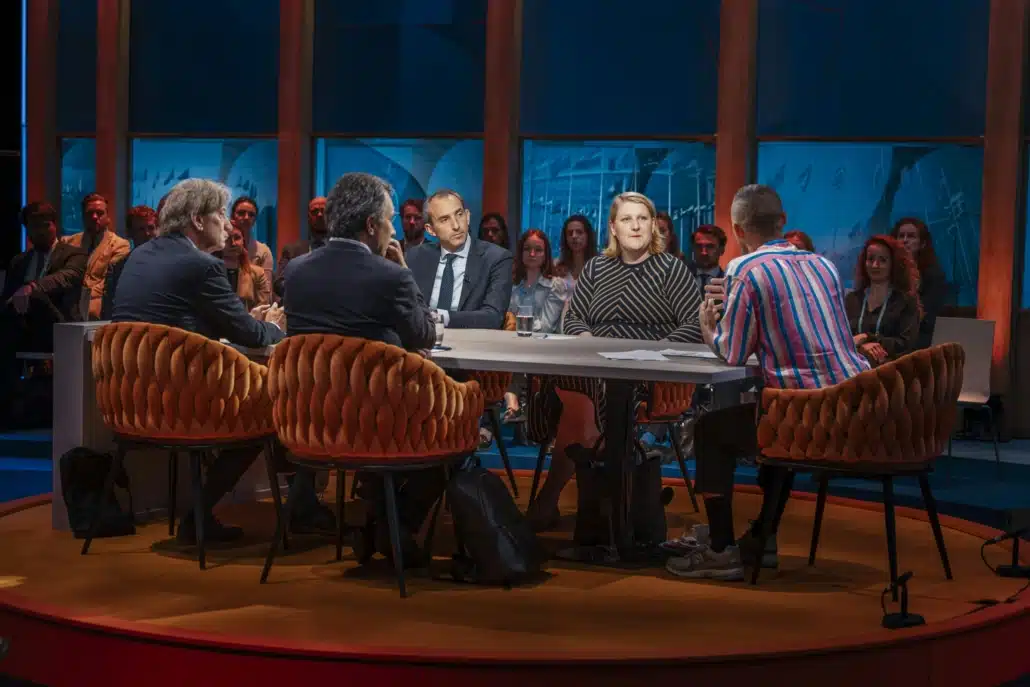
Rutte’s Diplomacy: Effective, But at What Cost?
But the most headline-grabbing occurrence was former Dutch PM and newly appointed NATO Secretary General Mark Rutte’s press moment with Donald Trump. “Rutte kept 32 frogs in a wheelbarrow,” Sweijs said wryly. “We saw the same Rutte we know from Dutch politics: charming, pragmatic, and highly attuned to political optics.”
The Secretary General reportedly leveraged personal relationships, even hosting Trump at the royal palace—a symbolic move that delighted the former U.S. president. “That gesture likely prevented a diplomatic incident. But it also raises eyebrows—particularly when set against Trump’s disregard for international law, such as in the case of the Iran strike,” Sweijs says.
Already referred to as the ‘historical’ the Hague Investment Pledge, with member states vowing to increase defence spending to 3.5% of GDP, plus an additional 1.5% for infrastructure and cyber resilience, while symbolically powerful, the pledge raises questions about feasibility. Sweijs is sceptical: “Spain has already made it clear it won’t reach this level, and it’s unclear whether countries like Belgium can either. This is reminiscent of the 2014 pledge to reach 2% by 2024—most only just made it.”
The summit also reaffirmed support for Ukraine, albeit without bringing it closer to full membership. “That’s significant, especially given Trump’s signals that he would reduce support,” Sweijs said. “Ministers were clear: a strong Ukraine is part of NATO’s broader deterrence posture.” An unexpected detail: support to Ukraine—military or otherwise—can count toward the 3.5% spending target. “That was not anticipated,” noted Sweijs. While clever, this accounting tactic may blur the line between internal capacity-building and external assistance.
Key Themes: Deterrence, Resilience, and Defence Industrial Cooperation
One recurring theme across the Forum was the idea of “invisible wars” — the conflicts that unfold in cyber space, through disinformation, and in domains where traditional military tools fall short. “Secretary General Mark Rutte highlighted the importance of fighting these ‘invisible wars’ in his opening remarks,” said strategic analyst Laura Jasper, an expert on the growing menace of Foreign Information Manipulation and Interference (FIMI).
“The evolving character of conflict demands a whole-of-society approach to resilience — from the trenches to space. As highlighted by our own research at HCSS, the convergence of domains, and specifically the escalation from the digital to the physical domain in regard to ‘under the threshold’ activities, requires not only resilience, but vigilance,” Jasper observed.
One of the key themes that emerged throughout the Public Forum was the critical importance of strengthening Europe’s defence industrial base, notes Irina Patrahau, Chair of the Energy Security and Critical Minerals programmes at HCSS. “Readiness is not just about military capabilities,” she says, “it’s a whole-of-society effort. Everyone should be on board and play their part.”
The discussions highlighted that modern deterrence requires more than just strategy and troops — it also demands resilient supply chains, secure access to critical raw materials, and industrial capacity that can meet the needs of a rapidly changing security environment. As Patrahau observed, “Strengthening the defence industry is key. We need quality, but also quantity. Stockpiles are an essential strategy for securing supplies.” These concerns were reflected in several of the Forum’s expert sessions, which tackled issues ranging from technological innovation to energy security and industrial preparedness.
The inclusion of supply chain resilience and critical minerals in the broader NATO discourse was a welcome development for Irina Patrahau. She underlined the need for concrete follow-up: “NATO’s critical minerals list should lead to more than just awareness — it must spark coordinated, impactful action, jointly taken by defence ministries and industry alike.” Her message was clear: to make deterrence credible and future-proof, Europe must invest not only in defence capabilities, but also in the foundational resources that make them possible.
As the dust settles, attention turns to implementing the Summit’s outcomes — including the landmark agreement to invest 5% of GDP in defence and resilience. “The 1.5% earmarked for broader resilience-building, including infrastructure marks a major step forward for NATO’s collective defence and its resilience agenda. It’s also a critical opportunity to double down on one of NATO’s greatest long-term challenges: climate change,” Laura Birkman commented, after expressing disappointment that climate change and climate-related security did not feature more prominently on the official NATO Summit agenda.
“Given the clear links between climate and security — from destabilisation risks to operational readiness — it was a missed opportunity,” she noted. “NATO has set ambitious climate targets, but those commitments need to be backed by visibility and action at the highest level,” says Birkman.
“To meet its emissions reduction targets (20% by 2030, net zero by 2050) and achieve its climate adaptation goals, NATO must ensure that its forces, infrastructure, and strategy are climate-fit, both at home and across its northern and southern neighbourhoods,” Birkman added.
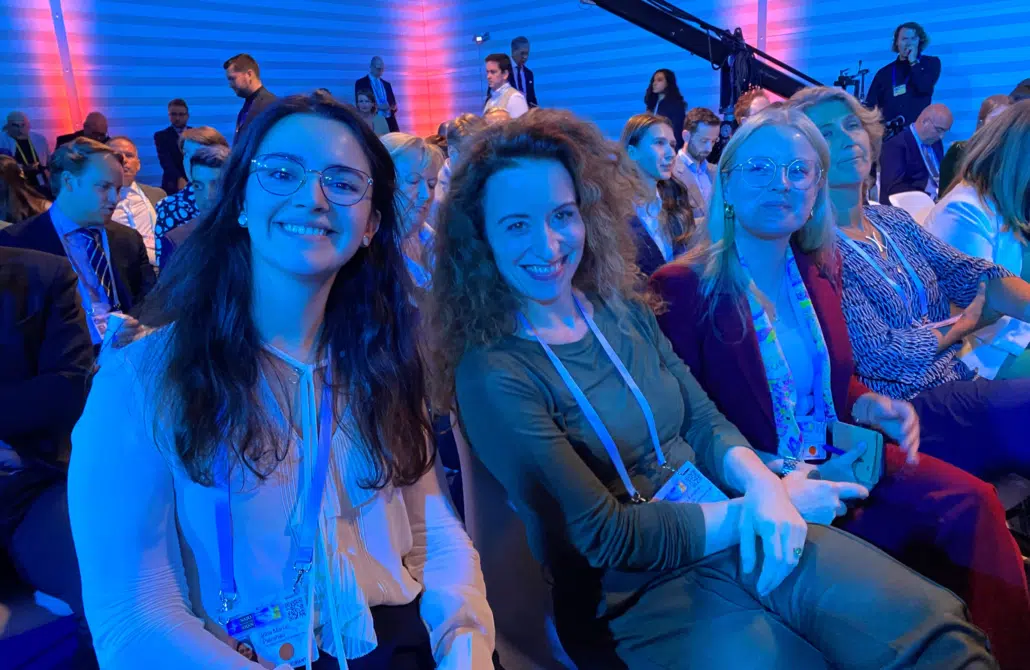
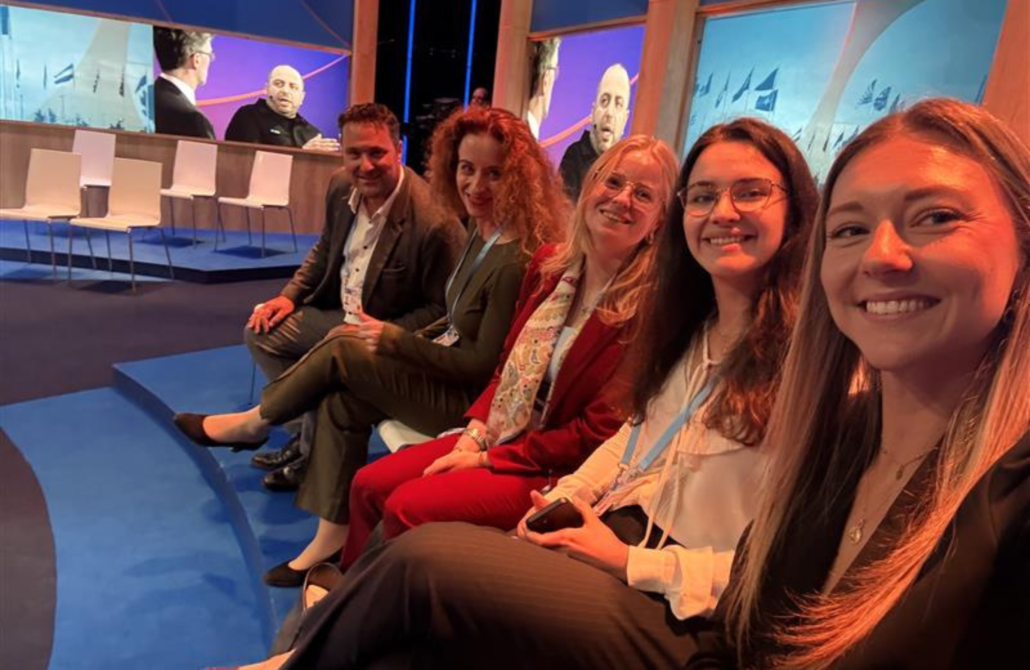
Critical Reflections: Transatlantic Trade or European Autonomy?
The Hague Summit may have succeeded in avoiding a crisis, but Tim Sweijs warns that it did little to address Europe’s structural dependencies.
“The allies want to do their best to create a level playing field and to trade more. The question is whether this refers to the transatlantic relationship — meaning that European allies would still largely purchase their equipment from the US — or whether it means that Europe is going to further build up its own defence industry,” Sweijs pointed out a lingering ambiguity: is the goal to boost Europe’s own industry, or to continue buying primarily from the U.S.?
“This remains a key tension. If Europe wants strategic autonomy, it must invest in its own capacity rather than deepen dependence on transatlantic imports,” he cautioned.
For Sweijs, the conclusion is clear: Europe must stand more firmly on its own feet. “It is clear that we in Europe must cooperate even more on defence,” he stressed. “I’m not talking about a European army, but rather about joint procurement of defence equipment, more firepower, more troops, and more brainpower on how we’re going to spend all this defence money.”
Only then, he argues, can Europe step out from under the shadow of U.S. politics. “We shouldn’t have to dance to Trump’s tune—or any president’s, for that matter. Strategic autonomy means making decisions on our own terms.”
The Summit’s outcomes are already generating spirited debate — not least among the expert community. While the reaffirmation of support for Ukraine and the ambitious 5% target represent important milestones, there are lingering questions about implementation, cohesion, and long-term strategy. The final communiqué, though symbolically significant, was notably short and at times vague — leaving key issues such as the future security architecture of Europe, strategic clarity on China, and concrete steps toward true defence industrial cooperation largely unresolved. Behind the scenes, uncertainty over the United States’ long-term commitment loomed large. And although calls for European strategic responsibility grew louder, specifics on how Europe will deliver on that promise remain thin.
Yet despite these concerns, the Summit also demonstrated the enduring strength and adaptability of the Alliance. “How all of this will play out remains to be seen,” HCSS research director Tim Sweijs concludes. “But let me end on a cautiously optimistic note: in 2025, The Hague Summit laid the foundation for a stronger Alliance. It is now up to the allies, their ministers — ánd their citizens — to build on it.”
***
And for us at HCSS, it marked a high point in our mission to bring strategic insight into the public sphere. We are immensely honoured to have served as one of the three official co-organisers of the NATO Public Forum — a role that allowed us not only to help shape the conversation, but to open it up. By programming substantive, diverse, and forward-looking sessions with partners from across the globe, we worked to ensure that diplomacy wasn’t confined to backrooms, but shared with and informed by the public.
From moderating panels on future conflict to advancing dialogue on resilience and innovation, HCSS played a vital role in what became one of the most ambitious public diplomacy efforts in the Alliance’s history. As a young institute with global ambitions, it was a privilege to co-lead such a major international undertaking — and a moment of real pride for our team.
Team HCSS
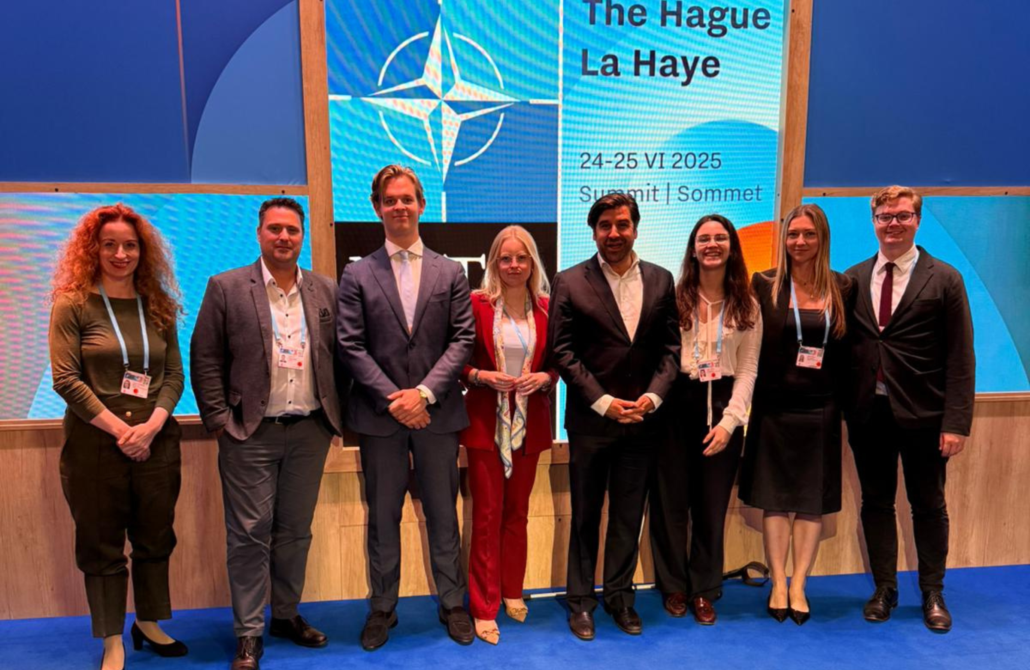
🟦 Missed the NATO Public Forum? Rewatch all panel sessions online.
📌 Follow HCSS on LinkedIn, X, and our website for more insights on the future of security and defence.

